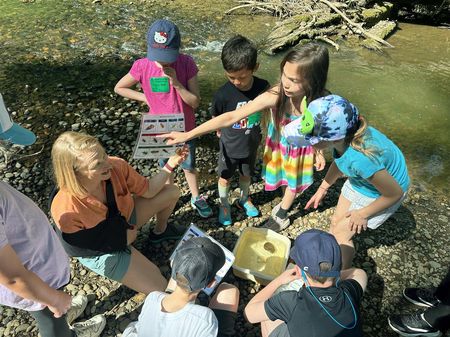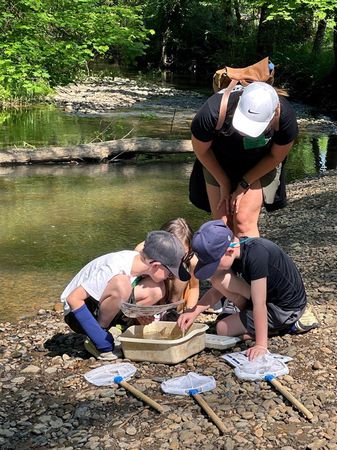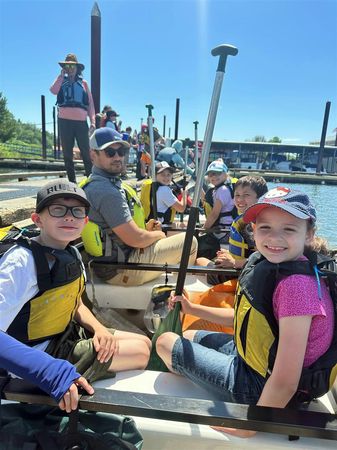Wednesday, May 31, 2023
 Woodland elementary students study macroinvertebrates at the Ridgefield Wildlife Refuge
Woodland elementary students study macroinvertebrates at the Ridgefield Wildlife Refuge
Woodland Public Schools’ elementary students took part in hands-on science experiments at the Ridgefield Wildlife Refuge and explored the Columbia River by canoe thanks to a grant from the Lower Columbia Estuary Partnership (LCEP).
Heidi Kleser, a third grade teacher at North Fork Elementary School, secured the grant for both North Fork and Columbia Elementary School students through her long partnership with the LCEP. “I have been collaborating with the LCEP for 15 years,” she said. “Field trips offer students ways to learn that typical classrooms do not, allowing them to build background with direct hands-on experiences many will remember for their lifetimes.”
Field trips serve as a powerful tool for students to build a solid foundation of knowledge and experiences. Unlike classroom-based learning, these trips allow students to immerse themselves in real-world environments, enabling them to develop a deeper understanding of various subjects. “Students need to have field experiences so they can breathe in the environment, work with others, and feed their curiosity for science,” said Kleser. “Not only did my students love the field trip to the Burnt Bridge Creek Greenway, so did our parent chaperones!”
 Field trips like these directly align with science curriculum students are learning in the classroom
Field trips like these directly align with science curriculum students are learning in the classroom
Effective field trips are carefully planned to align with the curriculum, reinforcing and extending classroom learning. The trip to the Ridgefield Wildlife Refuge was designed to complement the Next Generation Science Standards, with a focus on studying ecosystems. “By combining scientific concepts with practical experiences in nature, students gain a comprehensive understanding of the subject matter,” said Kleser. “Field trips provide opportunities for interdisciplinary learning, connecting different subjects and fostering a holistic educational experience.”
During their time in the field at Burnt Bridge Creek, students studied macroinvertebrates and planted trees. While eating lunch, the class witnessed a bald eagle soaring overhead. “One of our volunteers played an eagle call using her cell phone, and less than 30 seconds later, the eagle appeared,” explained Kleser. “The students raved about the experience when they returned to school and many parents mentioned how impressed they were by the format and overall experience for the trip.” While exploring the Columbia River, students paddled the Lake River in replica Native American canoes, identifying birds and their calls as well as other critters living along the riverbank. “This experience directly tied in with the Next Generation Science Standards emphasizing ecosystems,” said Kleser.
 Students explored in the Columbia River in canoes fashioned to look like ones Native American tribes used
Students explored in the Columbia River in canoes fashioned to look like ones Native American tribes used
Kleser discovered she wanted to be a teacher after exploring a myriad of interests growing up, “I had so many interests that it was hard to narrow down what I wanted to do, but I knew I wanted a career where I could embrace those interests and work with kids,” she said. “Since science had such an impact on my core, I wanted to work with younger kids to enable access to science and exploration, and now I’ve been working with elementary students, my passion, for nearly 20 years; I love what I do and I love the Woodland community.”
Learn more about the Lower Columbia Estuary Partnership:
The funding for the Estuary Partnership’s Explore Local project is awarded from the inaugural year of the Outdoor Learning Grant program, administered through the Washington State Recreation and Conservation Office (RCO) and the Washington Office of Superintendent of Public Instruction (OSPI). All participating 3rd graders are receiving 9-10 hours of science learning, six of which are through participation in field trips to Burnt Bridge Creek and Ridgefield Wildlife Refuge. All participating 4th and 5th graders are receiving 14-16 hours of hands-on, outdoor science learning – including three field trips throughout the school year and five on-campus lessons.
Learn more about LCEP from their website: www.estuarypartnership.org.